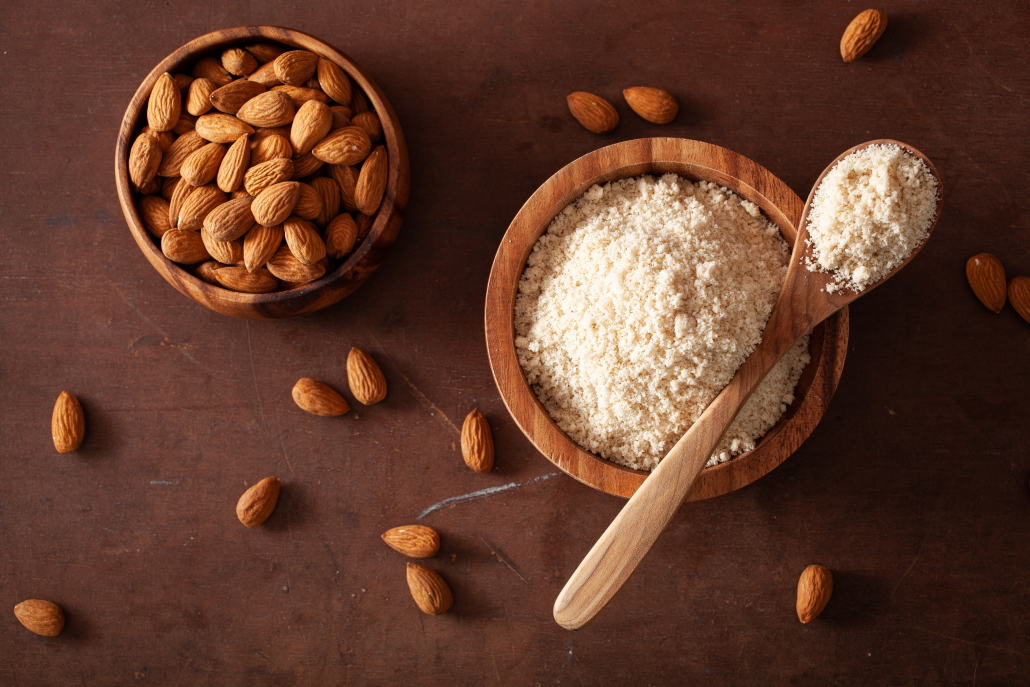We include products in articles we think are useful for our readers. If you buy products or services through links on our website, we may earn a small commission.
Almonds on Keto? Carbs, Benefits, and Possible Drawbacks

Most nuts are loaded with fats and proteins making them popular keto snacks. And almonds are some of the most popular nuts, whether they’re consumed whole, as flour, or a “milk”. But almonds do contain some carbs. So are almonds on keto a good choice?
After all, they do contain a moderate amount of carbs, they’re high in inflammatory omega-6 fatty acids, and they contain some antinutrients.
Let’s explore the role of almonds on keto, along with their health benefits and possible drawbacks.
Table of Contents
Almonds on Keto

When considering almonds on keto it’s important to remember that keto means eating high-fat, low-carb, and moderate-protein foods.
A standard ketogenic diet calls for a nutrient breakdown that looks like this:
- 70-80% of calories from fat
- 15-30% calories from protein
- 0-10% calories from carbohydrate
When starting out on keto you’ll want to reduce your carb intake to less than 20 grams per day.
Once your body is keto-adapted you can gradually increase your carbs up to around 60 grams per day depending on your activity level.
So down the line almonds may play a larger role in vegetarian keto and vegan keto diets, while providing a fat-rich keto snack for others.
Carbs in Almonds
For most people on keto the carbs in almonds are worth considering. Consuming around 80 almonds, or 100 grams provides 10 grams of net carbs to your daily intake.
10 grams of carbs are negligible on a high-carb Standard American Diet, but if you’re limiting your carb intake to 20 grams a day on keto, that’s almost half your allowance from only one food source.
Eating carbs at the beginning of a keto diet can also make it difficult to kick your carb addiction.
Here’s a comparison between the carbs in almonds compared to other popular keto nuts.
| Nut | Fat per 100g | Carbohydrate per 100g | Amount of nuts per 100g |
| Almonds | 53 grams | 10 grams | 77 nuts |
| Walnuts | 65 grams | 7 grams | 50 halves |
| Pecans | 72.6 grams | 4 grams | 65 nuts |
| Peanuts | 50 grams | 12 grams | 100 nuts |
| Cashews | 45 grams | 28 grams | 62 nuts |
Nutrients in Almonds
The nutrients in Almonds are highlighted by robust amounts of fat, protein, and hard to get magnesium and vitamin E.
| Nutrient | Per 100 Grams | %RDV |
| Fat | 53g | |
| Carbohydrates | 20.8g | |
| Dietary fiber | 10.8g | |
| Net Carbs | 10g | |
| Protein | 20.8g | |
| Significant Vitamins and Minerals | ||
| Vitamin B3 (Niacin) | 3.7mg | 23% |
| Vitamin B2 (Riboflavin) | .8mg | 60% |
| Vitamin E | 26mg | 173% |
| Iron | 3.7mg | 20% |
| Zinc | 3.1mg | 22% |
| Calcium | 291mg | 22% |
| Phosphorus | 466mg | 47% |
| Magnesium | 274mg | 65% |
| Copper | 1.0mg | 106% |
| Manganese | 2.5mg | 107% |
Benefits of Almonds on Keto
As you can see in the chart above, almonds are loaded with fat, protein, vitamin E and magnesium. Let’s take a look at how the nutrients provided by almonds on keto can translate into health benefits.
High in Antioxidants
The antioxidants in almonds are found in their vitamin E content as well as the polyphenols in their skins. So it’s not a great idea to chose blanched or skinless almonds. 1 2 3
Antioxidants reduce oxidative stress that can damage cells in ways that cause premature aging and lead to inflammatory diseases including cancer and heart disease. 4
One clinical study looked at the effects of feeding 3 ounces (84 grams to 60 male smokers. Researchers found that over four weeks this protocol reduced oxidative stress by between 23–34%. 6
Another 2006 study found that eating almonds as a part of meals reduced specific biomarkers of oxidative damage. 7
Reduced Oxidation of Cholesterol
In test-tube studies, the polyphenol antioxidants in almond skins have been found to reduce oxidation. 8 9
While human studies suggest that the antioxidant effects of polyphenols and vitamin E might be even greater when consumed together. One clinical trial revealed that simply snacking on almonds for a month resulted in a 14% reduction in oxidized LDL cholesterol. 10
High in Vitamin E
Vitamin E is an antioxidant that deserves some special mention since almonds are one of nature’s best vitamin E sources.
A single ounce of almonds on keto provides 37% of your RDV. 11
This matters because a high intake of vitamin E is linked with reduced rates of cancer, Alzheimer’s disease, and heart disease. 12 13 14 15 16
High in Magnesium
Magnesium is another nutrient that almonds provide in abundance.
This nutrient plays an important role in over 300 physiological processes. So it’s not surprising that a deficiency in magnesium is implicated in some serious health issues.
For example, up to 38% of people with type 2 diabetes are also magnesium deficient. The good news is that by reversing this deficiency these same people can improve insulin sensitivity and lower blood sugar. 17 18 19
Even if you’re not diabetic, the magnesium you get from almonds on keto can lead to significant reductions in insulin resistance. 20 21
Magnesium deficiency is also implicated in high blood pressure, a major driver of stroke, heart attack, and kidney failure. 22 23 The solution: more almonds! Boosting magnesium intake has been shown to reduce blood pressure. 24 25
Almonds Can Lower Cholesterol
Cholesterol on keto is an interesting topic. It can be surprising to hear that eating more fatty foods actually improves cholesterol levels for most people. Add in almonds on keto and they may get even better.
Some studies have found that almonds can lower (bad) LDL cholesterol levels. For example, a study where 65 prediabetic people got 20% of their calories from almonds found that LDL decreased by an average of 12.4 mg/dL. 26
A 2015 study found that eating only 1.5 ounces of almonds a day reduced belly fat while lowering LDL by an averqage of 5.3 mg/dL. 27
Almonds Support Intermittent Fasting and Weight Loss
The combination of protein and fat in almonds make them a highly satiating food, which is great when combining keto and intermittent fasting.
Studies have found that almonds significantly reduce hunger and food cravings. 28 And a study of 100 obese women found that participants who ate almonds lost more weight than those who didn’t. 28
If you’re interested in learning more about intermittent fasting click here. And for women-centered IF approaches you can learn more here.
Drawbacks to Almonds on Keto
Though almonds on keto offer numerous benefits, they’re not without potential drawbacks. These come in the way of:
- an overabundance of omega-6 fatty acids
- Nutrient blocking plant toxins and antinutrients
Omega-6 Imbalance
Humans evolved on a keto diet with an omega-3 to omega-6 fatty acid ratio of 1:1. 29
Yet on our current Standard American Diet the ratios are around 1:16.
Unfortunately, almonds are extremely high in omega-6’s, with 17.5 grams per 4 ounces, while offering only trace amounts of omega-3’s.
This matters because omega-6 fatty acids tend to promote inflammation.
An overabundance of omega-6’s has been linked to a long list of diseases including, heart disease, cancer, and diabetes, along with fertility issues, and psychological issues such as bipolar disorder and depression. 30 31 32 33
If you do eat a lot of almonds on keto, along with other keto nuts, be sure to balance all those omega-6’s with foods high in omega-3’s like keto seafood, keto fish, and omega-3 keto superfoods like salmon roe.
Plant-Toxins and Antinutrients
Plants have numerous naturally occurring pesticides, and almonds are no different.
Almonds are especially high in an antinutrient called phytic acid.
Studies show that for many people, phytic acid in foods can block the absorption of calcium, zinc, magnesium, iron, and copper. 34
Almonds contain one of the highest phytic acid levels of any food, with around 1200 milligrams per 100 grams.
Phytates are not likely a health risk for most people enjoying a keto diet centered on nutrient-dense keto meats. But for vegan and vegetarian keto dieters, learning how to reduce phytates and other antinutrients can be an important part of a well-formulated diet.
Though soaking can eliminate phytic acid in many grains, it’s not so effective with almonds. For example, one study found that soaking almonds for 24 hours only reduced phytic acid by 5%. 35
Almonds on Keto? The Bottomline
Almonds on keto can be a nutrient-rich snack providing an abundance of fat, protein, along with high amounts of magnesium and vitamin E.
However, almonds, along with most nuts are high in omega-6 fatty acids that can contribute to imbalance omega-3 to 6 rations that lead to inflammation and related disorders.
They also contain a moderate amount of carbs and should be enjoyed only occasionally, especially when just starting out on keto.
The mineral-blocking phytic acid in almonds may also be an issue for people who rely on nuts and seeds for their fat and protein. But for people on a carnivore diet and those who center their keto diet around nutrient-dense meats and fish, this phytic acid is likely not a big deal.
So should you eat almonds on keto? Sure, but beware the carbs, and be sure to balance out the omega-6’s with plenty of omega-3’s from animal sources and additions keto supplements like high-quality fish oil supplements, and beef organ supplements.





















